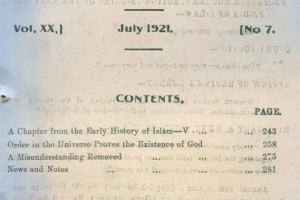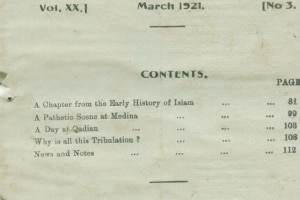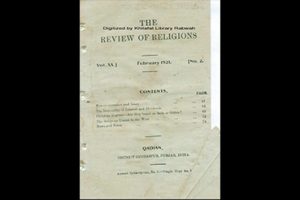
Professor Amtul Razzaq Carmichael and Imam Mansoor Malik, UK
Zoroaster the Prophet of Ancient Iran
Sheikh Ghulam Farid, B.A.
A summary of an article written a hundred years ago in The Review of Religions by Sheikh Ghulam Farid Sahib.
The author begins by outlining the purpose of man’s creation, pointing out that it was not merely to ‘…eat, drink and be merry.’ Rather, man’s life had a far superior purpose; to find and follow the road that leads to his Creator. In relation to this, the Holy Qur’an says, ‘And I have not created the Jinn and the men but that they may worship Me.’ [1] As a spiritual wayfarer was certain to encounter trials and tribulations along the way, Allah the Exalted established a system since time immemorial of sending prophets for the guidance of man and to lead them to the final destination of this spiritual path, God. With regards to this, the Holy Qur’an says, ‘And there is no people to whom a Warner has not been sent.’ [2] As the heading suggests, the author goes on to discuss the life of Zoroaster (as), the Prophet of ancient Iran.
His Birth and Childhood
In accordance with the consensus of scholarly opinion, Zoroaster (as) lived between the years 660-583 BC. The prevailing view on the place of his birth is the district of Atropatene or Azerbaijan. As all prophets, he was born to noble parents and his line traces back to the house of Manushihar. His father’s name was Porushaspo and that of his mother was Duktaub (Dughdhova). He was the third of five brothers.
The Durassobo, who served as the Pharaoh and Herod of the time, made various attempts to kill him from the very moment he was born. However, as he was in the special protection of God the Exalted, all of their attempts were met with failure.
The author points out that nothing is known of his boyhood and youth or about the society in which he was raised. When he reached the age of twelve or thirteen, he engaged in discussions with religious scholars and refuted their doctrines and beliefs.
Marriage and Fruits of Marriage
Zoroaster married thrice and had a total of six children, a son and three daughters from his first wife and two sons from his second wife. No child was born from his third wife.
Period of Religious Preparation
At the age of twenty, he abandoned worldly desires and pursued a life of righteousness, passing his time in meditation and prayer in a cave. With regards to this period, the author says, ‘…he was so cut off from the outside world that he is said to have kept his lips sealed for seven years.’
Revelation
At the age of thirty, he had an encounter with the angel Vohu Manah. The angel gave him the tidings of his prophethood and also led his soul into the glorious presence of Ahuru Mazda (the Wise Lord). This event corresponds to the spiritual ascension of the Holy Prophet (sa) to Heaven where he was shown signs, received various glad tidings, and was informed of the cardinal doctrines of the faith. According to tradition, Zoroaster had seven such conferences or encounters and the year of the first inspired revelation is known as ‘the Year of the Religion.’
The message of all previous prophets was initially rejected, and they were laughed at, mocked, expelled, and ruthlessly persecuted. Zoroaster was no exception. He travelled across the entire region and after ten years of continuous preaching, he won the heart of only one follower, his own cousin. In a state of absolute despair, he fervently prayed to God. This prayer of his was heard and success was destined for him. Although the eleventh and twelfth year of his mission were filled with trials and despair, he ultimately triumphed and won the heart of his people.
King of Iran Accepts Zoroaster
Zoroaster intended to preach his message to the King of Iran, Vishtaspa, and immediately encountered the relentless opposition of the wise men and priests of the court. Although Vishtaspa was intrigued by and drawn towards his message, the priests poisoned the King´s ears, who subsequently ordered Zoroaster to be imprisoned and to keep a close eye on him. This, however, was merely temporary and the King was soon convinced of the truth of Zoroaster´s message. The King had him released and pledged allegiance to him, which led to even further success; the royal family and the courtiers converted as well.
The Faith Propagated & Zoroaster’s Death

© Shutterstock
Following the initial years of trials, despair, opposition and persecution, the faith of Zoroaster had now become the state religion and even those who had severely opposed him and made every effort to prove him false, were forced to enter his fold – not by force, but by the earnest conviction of the truth of his message. Zoroastrianism spread far and wide, so much so that it is said that even some inhabitants of Greece accepted his message.
Considering the success of his mission and the fact that it was now the religion of the state, it was not long before the storm of opposition that had slowly been brewing eventually broke out, resulting in a bloody war. The war is known as ‘the War of Religion’ and was ultimately won by Vishtaspa, the pious hero of Zoroastrianism.
A long interval of rest and respite followed. However, during Vishtaspa’s absence from his throne, Arjasp of Turan, who had previously waged a war against the kingdom and the religion, took advantage of the opportunity and launched a fatal attack. The city and its temples were destroyed, and the priests and worshippers were martyred, including Prophet Zoroaster.
Filled with grief, Vishtaspa rushed back and avenged the death of Zoroaster. The religion progressed and flourished once again until it received a severe setback at the hands of Alexander the Great, who burned its sacred scriptures and levelled its temples to the ground.
Zend Avesta & the Zoroastrian Doctrines
The Avesta is the sacred book of the Zoroastrians and consists of four parts – the Yasna, the Visperad, the Vendidad and Khordeh Avesta, the first three constituting the Avesta in the stricter sense of the word. Some doctrines of the faith are given below. Zoroastrians believe:
- in one God
- in angels
- in the devil or Satan
- that man is the creation of God but was born with a free will to choose between good and evil
- in life on Earth as well as the Hereafter
- in the Day of Judgement
- in Heaven and Hell
- in revelation and prophethood
Our Leader´s Appeal to the Indian Mussalmans
(An Extract from the non-co-operation and Islam, by Hazrat Mirza Bashir-ud-Din Mahmud Ahmad (ra), Second Successor of the Promised Messiah (as) and Head of the Ahmadiyya Community)

Hazrat Mirza Bashiruddin Mahmud Ahmad (ra), Second Caliph of the Ahmadiyya Muslim Community.
In this piece, Hazrat Mirza Bashir-ud-Din Mahmud Ahmad Sahib, Khalifat-ul-Masih II (ra) passionately addresses the Muslims of India and their desire to join forces with Mr Gandhi, entering a pact of non-co-operation against the government. Hazrat Khalifat-ul-Masih II (ra) expresses his view on this matter in the following words, ‘…it is the height of injustice to declare it to be even lawful according to the precepts of Islam.’
Huzoor (ra) questions the faith of Muslims and their vigour to globally preach and propagate the message of Islam, which they verbally claim to hold dearer to their lives than anything else. This, however, seemed to be at odds with the state of the Muslims at present, who had forsaken their faith for worldly and material gains. Expressing the sentiments a true Muslim holds towards Islam and God, Huzoor (ra) says, ‘A Muslim does not sorrow for the world; he sorrows for his religion. The forgetting of one precept of Islam is to him more painful than the cessation of the shouts of victory, and the closing of one door of access to God causes him far greater uneasiness than the turning off [sic] all the successes of this life into failures. If the effacement of faith and the weakening of Islam cause a person no pain, it is a proof of the fact that his heart [sic] is full of the love of this world and that he has forsaken his God.’
Hazrat Khalifat-ul-Masih II (ra) reminds the Muslims of a similar situation that occurred some 700 years ago, when Islam was under attack and how the Muslims of that time dealt with the situation. Huzoor (ra) states most eloquently, ‘My dear brethren a thoughtful person never forgets a lesson and a wise man never loses sight of a precedent that serves as a warning. At this crisis, think over the fact that 675 years before this the Islamic power received a blow which was far severer than the present one…What weapon was it which proved serviceable at that time and how was the problem solved? A remedy that has already been tried with success, has a superior right to be resorted to when the same kind of disease breaks out again.’ Highlighting the weapon employed by the Muslims of that time, Huzoor (ra) says, ‘…it was with the weapon of mutual friendship and love and not with that of non-co-operation that they attacked the enemy…The course adopted by the Ulama [scholars] of that age…was that they made their way into the courts and assemblies of the Turks, with the determination to conquer the hearts of their conquerors.’
Hazrat Khalifat-ul-Masih II (ra) draws the attention of the Muslims in India towards this beautiful conduct; to win and capture the hearts of the enemy and those who have distanced themselves from Islam, rather than pushing them away even further. Reminding them of this principle and once again questioning their passion for religion, Huzoor says, ‘Is it Islam that has now lost the power of conquering the hearts of the conquerors and making slaves of them, or is it you who have lost the light of faith which your forefathers possessed?’
Huzoor carries on saying that the thought of having ‘co-operated’ in the past with the British Government and this co-operation not having yielded any fruit or religious prosperity should not fool the Muslims. Huzoor (ra) emphasises that deeds are judged by motives and highlights the intentions behind this so-called co-operation. Huzoor (ra) says, ‘Did you do all this for the glory of Islam and for the advancement of its cause? You did flatter them but you did so in order to fill your own pockets, to secure titles, to get employments, and to win false honours…You did rub your foreheads for hours and hours-nay, you rubbed your nose to an extent that the nose itself was rubbed out of existence, but by so doing you only proved that your profession to be the worshippers of the One God was only a lip-profession and that really you were worshippers of lucre and you do not refrain from doing even the meanest things for the sake of worldly gain and that you are even ready to forsake God for the sake of money.’
Huzoor (ra) once again emphasises utilising each and every opportunity to propagate and present the message of Islam, rather than distancing people from it, as its beauty has the power to capture and captivate the hearts of even the severest enemies. Huzoor (ra) argues that the Christians were previously dazzled by a Prophet, Jesus (as), why then would they not be dazzled and captivated by the beauty of the Holy Prophet (sa)? Huzoor (ra) says, ‘You are angry that these people, having availed themselves of your negligence have entered your house. But a Muslim is a lion. Is a lion sorry when his prey enters his den? Does he try to turn it out of his den, or does he wish to make a prey of it? When the Turks, having availed themselves of the negligence of your forefathers entered Mesopotamia, the latter did not turn them out by resorting to non-co-operation, but captivated them by friendship and love. Why do you not do the same? If you are sincere in your faith, then every man that comes in your way is a prey to you.’
Ahmadiyya Community’s Address of Welcome to Lord Reading and the Viceroy’s Reply
In this piece, the Ahmadiyya Muslim Community extends its heartfelt congratulations to Lord Reading and his honourable wife to their new office and welcome them to India. Following this and much in light of the guidance mentioned by Hazrat Khalifat-ul-Masih II (ra) in the previous article of utilising each and every opportunity to spread and propagate the message of Islam, an introduction to the Community and its founder, the Promised Messiah (as), is made, highlighting, in particular, the service he rendered for the cause of establishing peace. This included a clarification on the misunderstood and misrepresented concept of Jihad and loyalty to the government under which a Muslim lived.
In the end, a brief mention is made of the current circumstances in India and some advice is offered on how peace could be established. The author suggests, ‘In our opinion there is only one remedy for it, and it is this that both the ruler and the ruled should be made to realise fully that they are not infallible but only human…Similarly, so long as the people do not realise that both they and the officials are men and that both are equally liable to err, there can be no peace. But as the attitude of the Indians is a sequence of the attitude of the British Officer, and as it is easier to reform a particular class of men than a whole people, therefore we respectfully request Your Excellency to try to infuse a healthier spirit into the British Officers so that (1) if they or their subordinate officers happen to make a mistake, they should keep in view the real purpose for which His Majesty’s Government has sent them to such a distant country as India, rather than feel anxious about their prestige and (2) they should treat Indians as brothers. In our opinion, if this defect is removed, there will occur a corresponding change in the attitude of the people also.’
The Viceroy’s Speech
This article contains the reply of the Viceroy to the congratulations and suggestions extended to His Excellency.
His Excellency thanked the Ahmadiyya Muslim Community and reassured the Community, the Indian Muslims, and the Indian society as a whole, that the government was aware of the numerous problems faced by India and that no stone would be left unturned in finding a solution to them. His Excellency also reassured the Muslims of India that rumours of Great Britain being hostile to Islam were completely baseless and that justice would be upheld at all times, whether someone be British or Indian.
Full Issue available to read here.
ENDNOTES
[1] The Holy Qur’an, 51:57
[2] The Holy Qur’an, 35:25




Add Comment